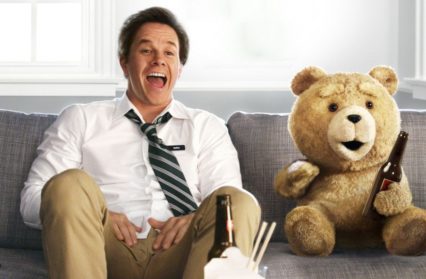Gary Raymond casts a critical eye over Ted, the latest movie offering from the often weird world of Seth MacFarlane.
Comedy is a serious business, as some famous wag once said. And within the first half-hour of the debut feature film from Seth MacFarlane, creator of TV’s Family Guy and American Dad!, it becomes apparent that the flaw to his flowering from the small screen to the big is that he simply has not taken it seriously enough.
Ted is the story of John Bennett (Mark Wahlberg), a regular guy whose best friend happens to be a living, breathing, smart-mouthed, pot-smoking teddy bear. Ted came to life as the result of a childhood wish, and has not left John’s side since he was eight. Now thirty-five and in a long-term relationship with Mila Kunis’ Lori, John comes up against the main dramatic dilemma of the film, the washing line from which MacFarlane will hang all of his moth-eaten jokes: he has to choose between his teddy bear and Mila Kunis. Hilarity ensues. It is barely worth noting the ludicrousness of the choice before John. There is not a sane man alive or dead who would not burn their teddy bear on the front lawn in a ritual of devotion to Mila Kunis. But perhaps that is asking a little too much of a film that, for all of its gags, wreaks of laziness from beginning to end.
One of the problems is that the storyline is so old hat, so unimaginative, that one wonders why MacFarlane uses a Teddy Bear at all and didn’t just cast Owen Wilson or Zak Galifanakis as the imbecile friend. The likelihood is that MacFarlane enjoys voice-acting too much (there is more than whiff of MacFarlane’s enormous glimmering ego about this) and found the comic potential of the incongruity of a child’s toy smoking pot, swearing, and having sex with obnoxious check-out girls too tempting to pass by. But the truth is this is just yet another buddy movie where the central character refuses to grow up and shed his debilitating immature friend. Hollywood has done this tract to death, and any suggestion that the use of a talking Teddy Bear might inject something exciting and fresh quickly withers away.
It’s not as if the jokes are not funny. They are. The problem is that they have all been done before, by MacFarlane himself, and better, in his TV shows. The connection between Ted and MacFarlane’s other creations, Family Guy and American Dad!, is paraded so openly a reasonable question would have been why he did not just direct a movie version of one (or both) of these. Patrick Stewart’s voiceover only serves to remind how funny he is in American Dad!, and how stale the idea sounds here. The joke is the incongruity of a crisp English voice saying things like ‘bum’ and ‘poo’ and ‘Apache helicopter’. There is nothing wrong with toilet humour, but MacFarlane goes no further than putting crude language into the mouths of those from whom society would least expect it. The premise of the film and the talent of those involved promised so much more than low-rent fart jokes and a fight scene that was better played out between Peter Griffin and a man dressed as a chicken.
But the relationship between MacFarlane’s TV shows and this film goes further. MacFarlane’s voice for Ted is so close to that of his Peter Griffin, the father from Family Guy, that it is impossible to separate the two for much of the film, and although there is a thudding post-modern quip about the similarity toward the end, it only adds to the feeling that the film is a busman’s holiday for the cast of MacFarlane’s TV shows. Cameos for the voiceover artists abound, and not a single one manages to land a punch.
Family Guy and American Dad! are two of the most intelligent, shocking and exciting shows on TV anywhere in the world. MacFarlane is an important creative voice in comedy and his progression to film is something that should have been a glorious thing. But Ted is one joke: How funny would it be for a Teddy Bear to say “motherfucker”? That may have raised a hearty laugh had Rupert, the teddy bear of psychotic baby Stewie in Family Guy, come alive and said it during one of the famous ten-second tangents that are MacFarlane’s calling card, but for an hour and forty-five minutes it not only becomes tiresome, but it becomes a bit pointless.



 Enjoyed this article? Support our writers directly by buying them a coffee and clicking this link.
Enjoyed this article? Support our writers directly by buying them a coffee and clicking this link.








